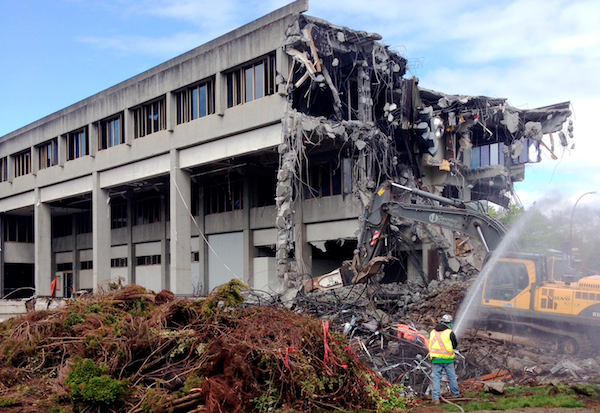
Repurposing construction waste at the University of British Columbia has become one of the essential pillars in UBC’s efforts to become a zero-waste campus.
Construction waste is a significant issue. Annually, nearly 1.4 million tonnes of construction and demolition (C&D) waste material is generated in the Lower Mainland, accounting for almost a quarter of the total waste disposed of in the region – with demolitions alone representing 90 per cent of this value, a Metro Vancouver report shows.
With a commitment to sustainability, UBC is working to reduce how much waste from building construction ends up going to the landfill. UBC’s Zero Waste Action Plan sets a goal to have 75 per cent of such waste diverted from landfills towards recycling and reuse. UBC’s green building initiatives are also aligned with these efforts, and mandates that LEED Gold certificates are issued for new academic buildings.
The demolition of the General Services Administration Building demonstrated the potential of what’s possible when vacating and demolishing an old building.
The first phase was a pilot project that facilitated the reuse of office furniture and equipment prior to demolition. The second phase ensured that the concrete and other debris left from the tear-down of the building was reused.
UBC Sustainability Coordinators played a key role in the first project by holding a ‘garage sale’ style event that enabled departments and faculties to purchase needed resources at minimal cost.
Hundreds of thousands of dollars were saved by various University units by not having to spend money on acquiring new furniture.

Photo credit: Bud Fraser
Vicky Baker, Project Manager with the Department of Geography, recalls the garage sale as one of her most memorable experiences as a sustainability coordinator.
“We ensured that most furniture and other contents were re-used rather than sent to the landfill, and that the rest was disposed of responsibly. The university saved hundreds of thousands of dollars, and we raised nearly $5,000 for the United Way,” says Vicky.
According to the report documenting the initiative, about 39,000 kilograms of furniture was diverted from the landfill. “Library Services, who has taken close to 20 per cent of the sold furniture in GSAB, estimates they have saved approximately $400,000.”
The second project, led by UBC Properties Trust, ensured that over 4,000 tons of demolition waste was repurposed after the GSAB building was demolished.
With a high waste diversion rate achieved, the project set an example for how large amounts of concrete can be not only recycled but reused on the site and in nearby projects.
"Repurposing construction waste materials is something that has been going on for years across campus and it is part of our overall commitment to sustainability,” says Bud Fraser, Senior Planning and Sustainability Engineer with Campus and Community Planning.
“Crushed concrete is used as road base or fill and other materials are sent out to recycling companies who will reprocess them into new or different products,” says Bud.
Most large demolition and construction projects across campus are administered by UBC Properties Trust, which selects private demolition and waste management companies to undertake demolition projects.
Zero-waste aspirations are part of UBC’s overall commitment to sustainability. The 20-year Sustainability Strategy for the Vancouver campus provides a long-term strategic direction to advance regenerative sustainability across all aspects of the university.